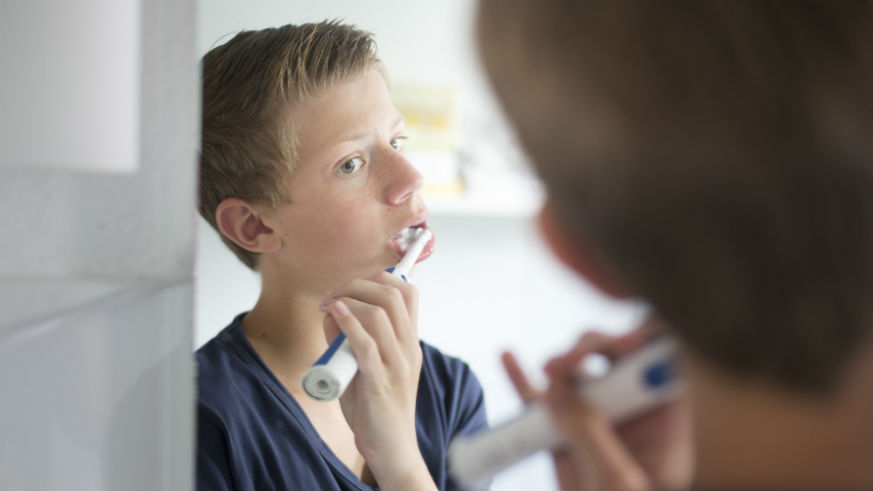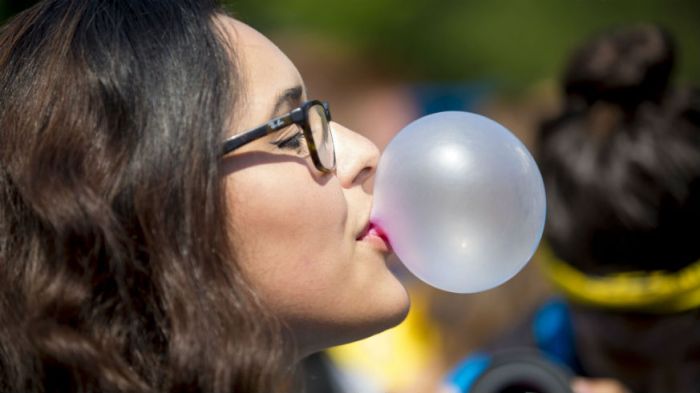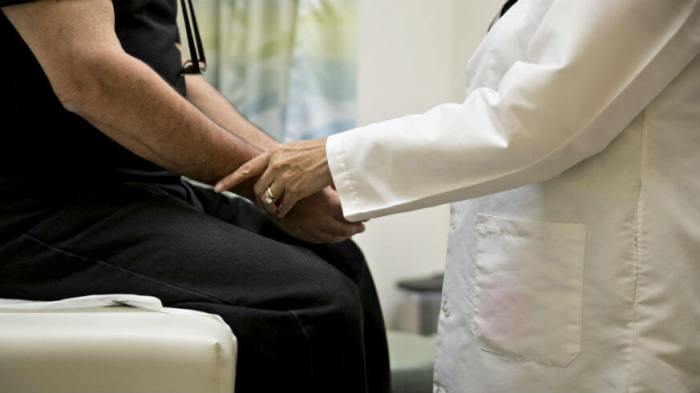Last year was the year for gut health. You finally started taking a probiotic, eating kimchi even when you’re not at a Korean restaurant and sipping kombucha even though you were extremely skeptical about drinking anything fermented. You’re all about adding things into your routine to boost your gut, but what about the things you should remove? Unfortunately there’s a common gut buster you’re exposing yourself to twice a day: triclosan in toothpaste.
If that sounds vaguely familiar and you regularly follow health news it’s likely because the controversial anti-microbial was banned from soaps by the FDA several years ago. You’ll still, however, find triclosan in toothpaste and more than 2,000 other common consumer products. So what do you need to know about this inflammatory ingredient and what does it do to your gut health? We explain the findings of a new study that shed some light.
Why is triclosan in toothpaste?
If the ingredient was banned by the FDA from soaps, why is it in toothpaste? Good question. Big brands you see on store shelves (and also in your bathroom) don’t regard the ingredient as dangerous, even though a 2017 study showed that triclosan in toothpaste can build up on your toothbrush and stay there for weeks. That makes it easier for the triclosan in toothpaste to reach your bloodstream and organs through your gums — since, hopefully, you’re not ingesting much actual toothpaste.
One of those brands, Colgate, told Time that they still use triclosan in toothpaste to “fight harmful plaque germs that can cause gingivitis.” But new study reveals that the ingredient might have some serious consequences that could outweigh its plaque-fighting benefits.

Potential triclosan side effects
Triclosan in toothpaste could be messing with your microbiota, the microbes found in your intestines that contribute to your gut health. A team of researchers lead by Guodong Zhang from the University of Massachusetts Amherst found that even low-grade exposure to triclosan lead to side effects that may also happen in humans.
In one trial, the researchers fed mice a diet with low-dose triclosan for three weeks and found that was enough to deplete their levels of Bifidobacterium, a type of probiotic bacteria that holds inflammation fighting health benefits. “Feeding triclosan to mice reduced the diversity and changed the composition of the gut microbiome, a result similar to what was observed in a human study conducted by others,” a press release about the study explained.
In another trial, mice with a predisposition to inflammatory bowel disease (IBD) or colon cancer were also exposed to low doses of triclosan for a short period of time. Researchers found that exposure to the ingredient promoted inflammation, worsened symptoms and increased tumor size in the mice. All in all, the researchers found that “triclosan altered mouse gut microbiota, increased inflammation, increased the severity of colitis symptoms and spurred colitis-associated colon cancer cell growth.” More research needs to be done into potential triclosan side effects in humans related specifically to gut health.
What other products have triclosan?
You know there’s triclosan in toothpaste, so you know to keep a lookout in the ingredients list from now on when you’re restocking — but what about those other 2,000 products? And are there brands that don’t put triclosan in toothpaste?

Although you’ll find the inflammatory ingredient in many big brand toothpastes, Crest does offer a line without triclosan, the parent company of Sensodyne and Aquafresh (GlaxoSmithKline) has removed triclosan from those products and you can always turn to organic brands like Tom’s. Amazon has several smaller brands of toothpaste that don’t use the ingredient, like Tree Tree Therapy, Jason Natural Cosmetics and Nature’s Gate.
If you want to track down whether your other personal care products have triclosan, you can turn to the Environmental Working Group, which has a guide to consumer products that have the ingredient. Warning: You will find everything from hand sanitizer and antibacterial hand soaps to face cleanser on this list.
Is it safe to use toothpaste that has triclosan?
More research still needs to be done on triclosan side effects in humans. Although studies in mice and zebrafish have proven the ingredient affects the health of these animals, they are not humans, and the results cannot be assumed to hold true in us as well. If you’re worried about the ingredient, brands are making it easier to switch to a toothpaste that doesn’t use triclosan without breaking your brand loyalty. So if you find it easy on your mind and wallet to go with a triclosan-free toothpaste, go for it. Otherwise, you’ll need to look at what research exists right now, decide how you feel about the potential risks and talk to your dentist about whether you should switch.



















